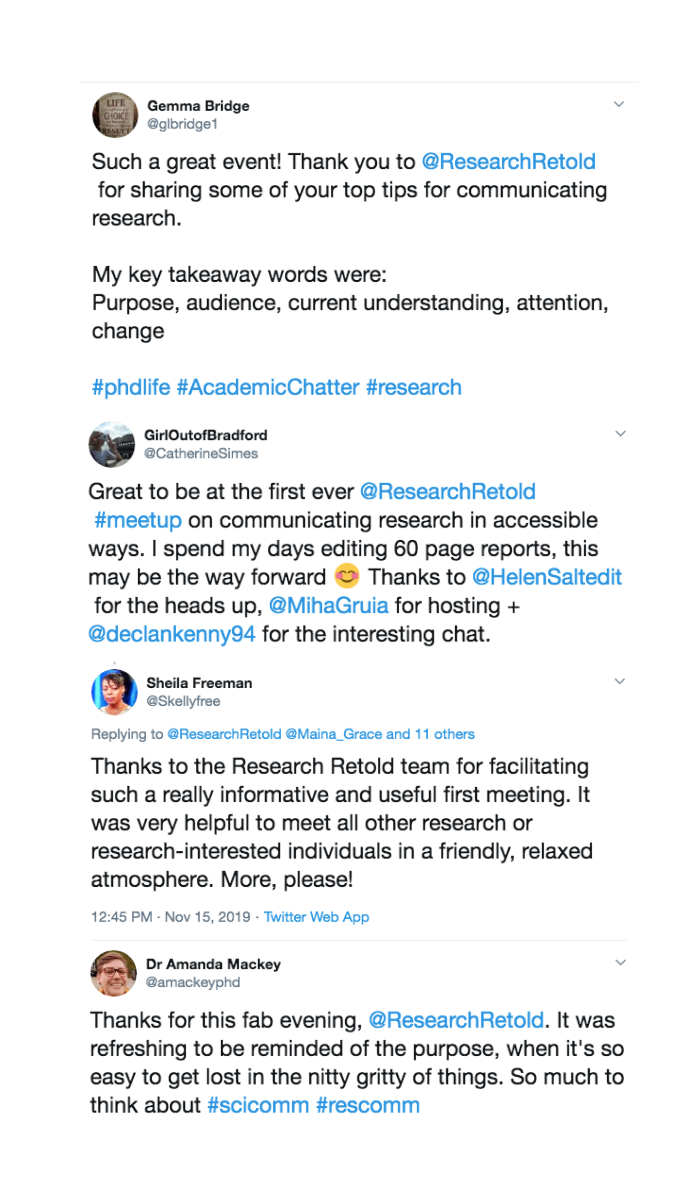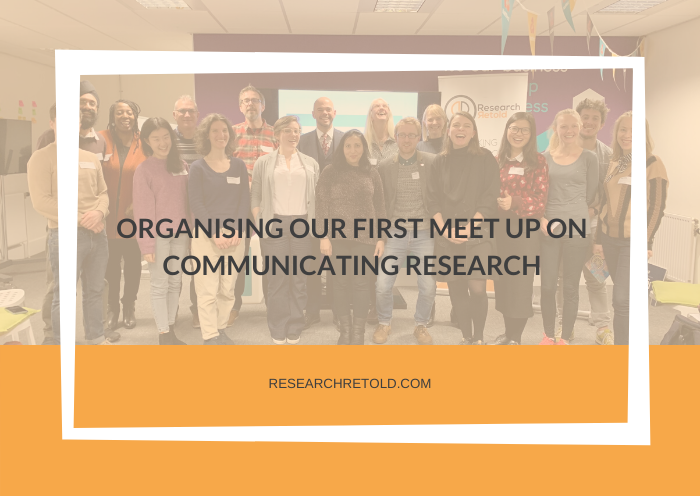In this blog post, we share our experience of organising our first meetup on communicating research.
Although this was the first time we organised an event like this, based on the feedback we received from the participants, it was very successful. Here we cover three aspects that we feel contributed to the success of the event on the night. We hope these can help you if you’re thinking of organising something similar.
Why organise a meetup?
A meetup is an informal meeting or gathering.
I was first introduced to the concept of meetup a few years ago. I remember going to one on data science and connecting with people in Sheffield interested in or working in this field.
Ever since, I’ve associated the concept of a meetup with groups of people interested in a topic, willing to share information and exchange experiences and insights on a set topic, in an informal setting.
Last year we organised a meetup in collaboration with Dotkumo on disinformation as part of Leeds Digital Festival. That event was a collaboration, so we had support from Richard and his team to organise and promote it.
This time… we went solo! Why?
- First, we want to give back to the community and share our experiences, tips and insights on research communication.
- Second, we want to build a community. We know there are many writers, communicators and researchers who are interested in communicating research, and we wanted to provide the space for these unique individuals to meet.
- Third, it’s fun and we love meeting new people! What is there not to love about a bunch of cool people getting together to talk about something they are passionate about? That’s exactly what we did and we enjoyed every second.
Key factors for a successful meetup
A lot of people are wary of organising free events. Especially as a young startup, with not a huge budget and sponsors to organise events, there is a risk that people simply won’t show up. We’ve all been guilty of signing up to free events on Eventbrite and not showing up on the day…
We were aware of this ‘danger’ but also determined to prevent it from happening. So here are a few things that we think contributed to the success of our meetup.
1. Planning
We started planning for the meetup one month and a half in advance. The idea was not fully formed at the beginning but we knew it was important to agree on a date, venue and time to set the wheels in motion.
The first step was to create our Eventbrite page (free) and include the details:
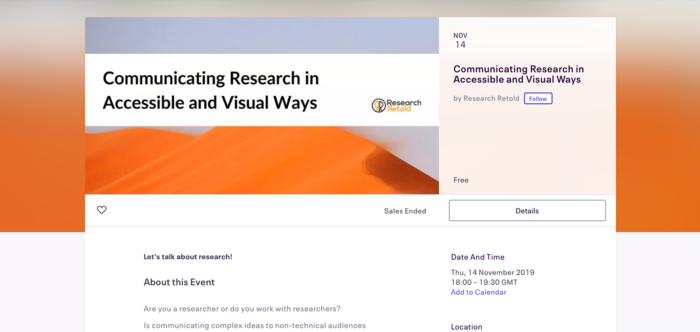
For the description, we kept it short, sweet and vague enough to allow us to tailor the content closer to the date:
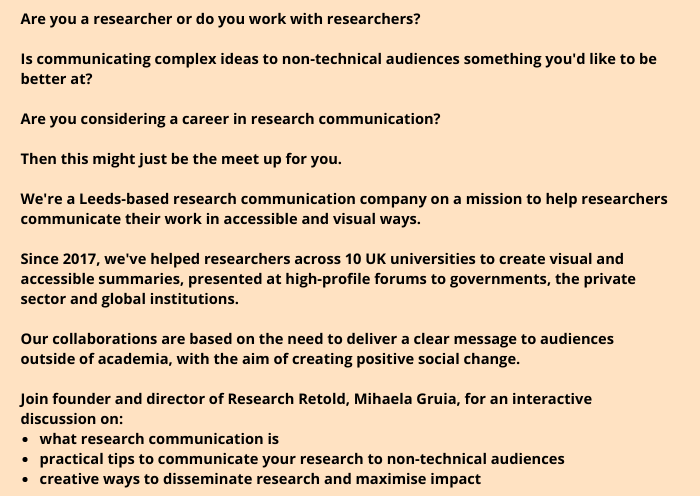
Once we had our Eventbrite link, we also created a friendlier short link that to use online: bit.ly/meetuprescomm.
2. Branding
Creating visuals to promote the event was part of our planning. We used Canva to create images for online and offline promotion. We promoted the meetup on Twitter and LinkedIn, our main platforms for engaging with our community. Posts went up 1-2 a week, and, closer to the event, we pushed a bit harder on the promotion.
We are on a mission to help researchers communicate their work in accessible and visual ways. If you are a researcher or work with researchers, register for our #meetup today:https://t.co/SWaC9j3Os3 #Leeds #research #scicomm @AcademicChatter pic.twitter.com/SxPJvkQXly
— Research Retold (@ResearchRetold) October 10, 2019
SPOTTED! Flyers for our November #meetup in the reception of @nexusunileeds. Are you a researcher passionate about communication? Come along! https://t.co/SWaC9j3Os3#scicomm #research #researchimpact #impact #Leeds pic.twitter.com/u8jQmpJ8Bk
— Research Retold (@ResearchRetold) October 18, 2019
Join us for an interactive discussion on research communication. Sign up now! https://t.co/GRnKzj3QmD#Leeds #research #meetup #scicomm #rescomm pic.twitter.com/udzeuICJuO
— Research Retold (@ResearchRetold) October 21, 2019
A few days left before our meet-up in #Leeds this Thursday! Thanks to those who signed up, we’re excited to meet you. If you haven’t yet, grab one of the last few tickets left 🎟️ https://t.co/GRnKzj3QmD #research #meetup #scicomm #rescomm pic.twitter.com/hUVqmeoHOv
— Research Retold (@ResearchRetold) November 11, 2019
In addition, we used the events or speaking engagements we had going on in October to promote the event.
Finally, we sent personalised messages to followers of our Twitter community who are based in Leeds letting them know about the event. We can’t stress the importance of personalisation when engaging with followers in this way because impressions online matter and no one likes to be spammed with something they have no interest in.
3. Communication
As an event organiser on Eventbrite, you have access to the names and email addresses of those who signed up.
Our director Mihaela used this opportunity to connect with the participants ahead of time.
Ahead of the event within 4-5 days, Mihaela sent out this email to the participants:
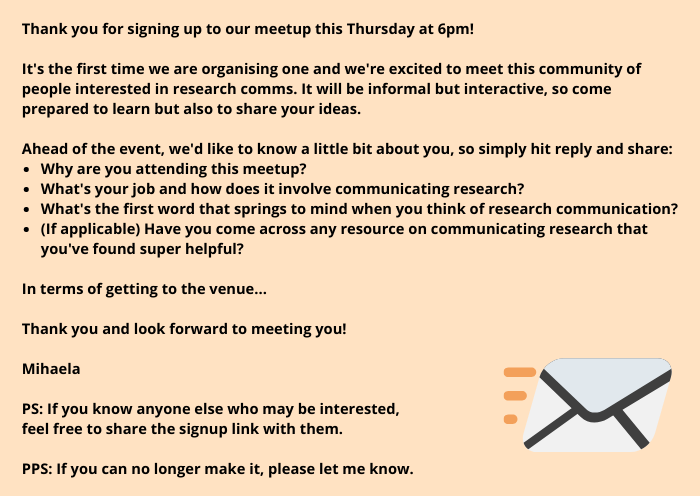
The above email served a few purposes:
- Acknowledged people’s effort and intention to sign up to our event
- Created anticipation
- Gave people the chance to get involved even before attending the workshop
- Clarified any details about the location
- Gave us the opportunity to tailor the content
- Gave us a chance to come up with a unique interactive exercise based on the answers
- Allowed people the opportunity to let us know if they couldn’t make it
Out of the 20 people who signed up, 19 replied and 18 people showed up.
The email interaction allowed us to build a rapport with the participants and gave us an insight into their backgrounds.
As a result, we tailored the content to include a little bit of what everyone was interested in.
Moreover, we created a unique interactive exercise which we would have not been able to create otherwise.
4. Delivery
On the day we signposted the event clearly on the street and in the building which made it easy for people to find us (although some still struggled because our office building is kind of hidden, sorry!).
One of our team was downstairs signing people in and offering their name badge. The rest of us were upstairs, greeting people and offering them soft drinks and snacks (very important if organising an event straight after work!)
The session was a mix of presentation, audience participation and interactive exercises. We tried our best to keep it informal, interactive and light while offering valuable insights.
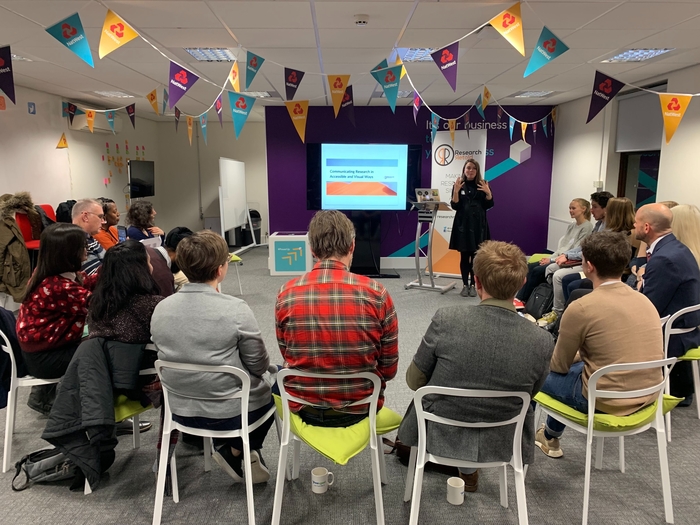
A key part of the meetup was allowing people to introduce themselves. This was a great opportunity for people to identify who in the room they would be interested to speak/collaborate with.
We then used the answers to one of the email questions, to create a slide about the words that spring to mind when they think of communicating research:
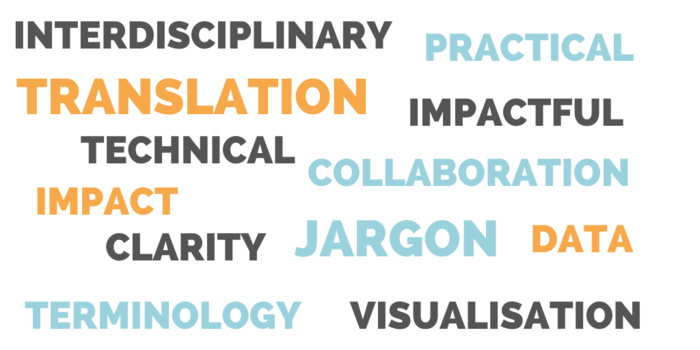
In the interactive exercise, we paired researchers with non-researchers and gave them a task that tested the skills of communicating research in a live format. People really enjoyed this exercise because it gave them a flavour of the process involved in research communication and some of the challenges as well.
At the end of the event, we had 30 minutes for networking and finishing off the nibbles.
For a personal touch, each participant left with a handout with the key points from our presentation and a personalised hand-written thank you note.
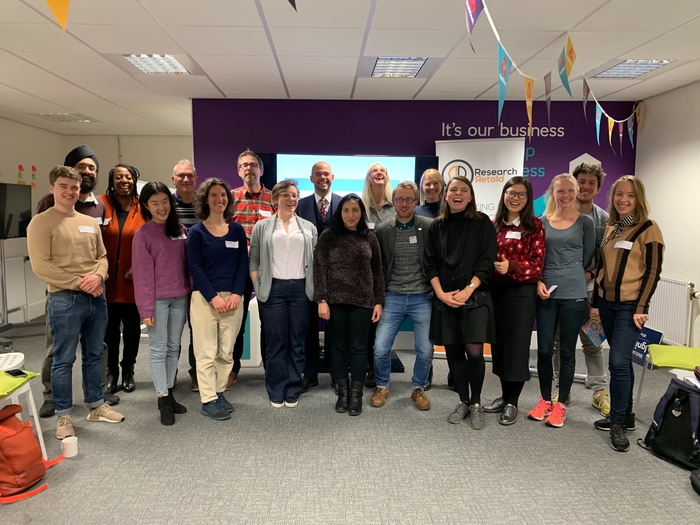
Conclusion
Overall, we really enjoyed organising this meetup and getting to know people from the community who are interested in research communication.
We had participants attend from Leeds, York, Saltaire, Bradford and Sheffield.
We loved learning about their diverse backgrounds and we look forward to staying in touch and organising the next meetup!
If you want to stay up to date with upcoming events follow up on Twitter and join our monthly newsletter!